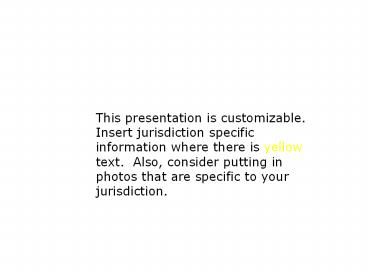Recycling and Compost Training - PowerPoint PPT Presentation
1 / 27
Title:
Recycling and Compost Training
Description:
Title: Recycling and Compost Training Subject: Recycling and Compost Training PowerPoint presentation Author: Todd Sutton Last modified by: Swaby, Stephen_at_CalRecycle – PowerPoint PPT presentation
Number of Views:252
Avg rating:3.0/5.0
Title: Recycling and Compost Training
1
This presentation is customizable. Insert
jurisdiction specific information where there is
yellow text. Also, consider putting in photos
that are specific to your jurisdiction.
2
Insert Property/Business Name/Address
- Recycling Compost Training
- 20XX
- Jurisdiction Name)
3
Mandatory Recycling and Composting for Businesses
Compost
Recycling
Trash
4
What to Recycle
- Paper
- White paper
- Colored office paper
- Envelopes
- File folders
- Post-It Notes Staples are ok
- Cardboard
5
What to Recycle
- Glass Bottles Jars
- Food drink containers only
- Empty before recycling
6
What to Recycle
- Almost All Plastic
- Water Juice Bottles
- Milk Jugs
- Rigid Tubs Lids
- Clamshell Containers
- Plant Containers
7
What to Recycle
- Aluminum Cans, Foil Trays
- Steel Tin Cans
8
What to Compost
- Food Scraps
- Food-related Paper Products
- Paper towels, napkins, plates paper cups
- Waxed cardboard, milk and juice cartons
- Compostable Plastics (only with green label)
- Paper towels
9
Very Few Items Belong in the Trash
PLASTIC BAGS
STYROFOAM
PLASTIC WRAP
HARD TO RECYCLE PACKAGING
WRAPPERS
10
Central Office Collection Station
- All 3 containers placed together
- Less trash with more recycling and composting
11
Dont Throw These in Trash
Please No Electronic Devices Inside there are
Toxic Materials
12
Dont Throw These in Trash
Please No Batteries, Lamps or Ink/Toner
Cartridges Inside there are Toxic Materials
13
Avoid Contamination
- Clean white office paper is made into new white
office paper and high quality tissue products - Mixed paper becomes cereal boxes, paper towels
tissues - Cardboard becomes new boxes
- Recycled glass bottles are used to make new glass
bottles and jars - Recycled plastic bottles can be used to make new
products like carpet and fleece vests and jackets - Food scraps are composted and sold to farmers,
wineries gardeners
14
Mixed recycling is loaded onto conveyor lines
which transport the material to the top of a
two-story platform.
15
On the platform, mechanical manual separation
is used to sort the recyclables into individual
commodities. Plastic bags cause significant
equipment problems and shutdowns.
16
Workers on the platform pull cardboard, paper,
plastics glass and drop them into corresponding
bins where the material is collected at the
ground level.
17
Glass is sorted by color. Plastics are separated
by type. Paper is separated by grade (mixed
paper, white paper, newspaper, cardboard, etc.).
Steel Aluminum are captured by magnets and air
currents.
18
Separated materials are compacted into bales and
are ready for end markets. Manufacturers
purchase the commodities and make them into other
plastic, paper, glass, and metal products.
19
Most recyclable materials are sold to
manufacturers in China other Pacific Rim
countries. While we have a good system in place,
it is always best to Reduce our consumption,
Reuse existing materials, then to Recycle, and
finally Buy Recycled Content products.
20
Insert Facility Name Where Materials are
Composted in Your Jurisdiction
21
Compostable material is ground into small pieces
and formed into piles. The piles are covered
with a breathable fabric that accelerates the
natural cycle of decomposition with higher
temperatures.
22
In 75 days food scraps and paper products are
transformed into a nutrient rich soil amendment,
COMPOST!
23
The finished product COMPOST is used by
vineyards and in organic farming applications to
grow more food and trees.
24
Using compost means pesticides arent required,
soil fertility is increased, water is conserved,
and soil erosion is mitigated.
25
Be A Hero
- Fight Climate Change
- For every 1 ton of mixed paper recycled, about
4.3 tons of CO2e are avoided. - Save the Forests
- Recycling 1 ton of paper saves about 24 trees and
7,000 gallons of water. - Clean the Air and Water
- Recycling metals reduces air pollution by 85 and
water pollution by 75. - Save Energy
- You could watch more than 2½ hours of television
with the energy saved from recycling just one
aluminum can. - Help the Economy
- Recycling creates six times as many jobs as
landfilling.
26
Resources
- Insert Resources
27
For More Information
- Contact































